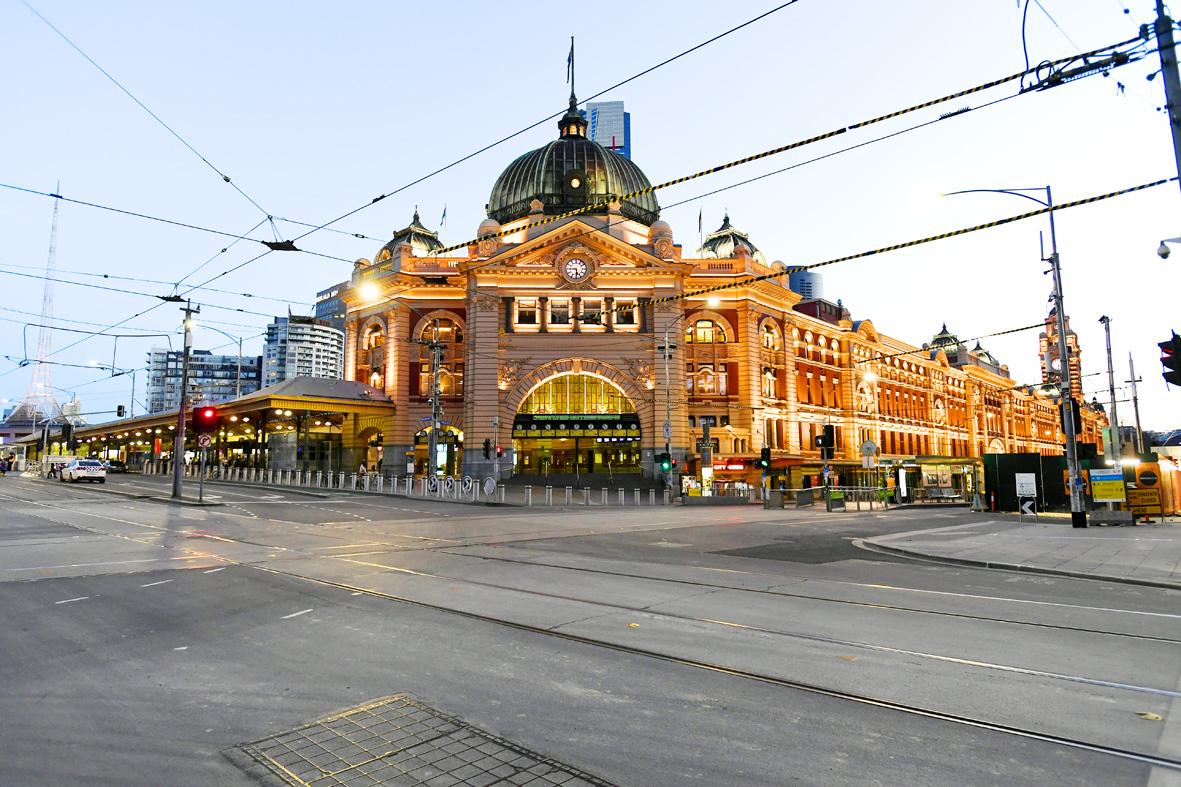Australia yesterday imposed an overnight curfew on its second-biggest city and banned people from moving more than 5km from home to control a growing COVID-19 outbreak that is infecting hundreds daily.
Declaring a “state of disaster,” Victoria Premier Daniel Andrews said that Melbourne would move to Stage 4 restrictions until Sept. 13 given “unacceptably high” levels of community transmission.
Under the harshest rules in Australia to date, city residents are to face a curfew from 8 pm to 5 am for the next six weeks. Only those carrying out essential work, or seeking or providing care, are to be allowed out.

Photo: EPA-EFE
“The time for leniency, the time for warnings and cautions is over,” Andrews said. “If you are not at home and you should be, if you have the virus and are just going about your business, you will be dealt with harshly. Lives are at stake.”
Melbourne residents would be limited to an hour of exercise a day, no further than 5km from home, starting last night.
Only one person per household is allowed to shop for essential items each day, also within the same strict radius.
Most school and university students in Melbourne would go back to online learning from midnight on Wednesday, just weeks after returning to their classrooms, while weddings would also be banned.
The sweeping new measures follow a citywide lockdown that began early last month, but has failed to curb the spread of the virus, with Andrews blaming the continuing rise in cases on people flouting stay-at-home orders.
“These are the decisions made because anything short of this will not keep us safe,” Andrews said, adding that anything less “will see it drag on for months and months and months.”
Additional restrictions affecting workplaces would be announced today, Andrews added, suggesting that non-essential businesses would face closures.
Victoria accounts for the vast majority of active coronavirus cases in Australia, recording 671 new cases and seven deaths from the virus yesterday.
Health authorities have linked the resurgence to security bungles at hotels used to quarantine international travelers that allowed the virus to leak back into the community.
Victoria Chief Health Officer Brett Sutton said that an estimated 20,000 cases were averted during Stage 3 restrictions, but flattening the curve to hundreds of new cases a day was “intolerable.”
“We need to see those numbers through the eyes of our healthcare workers and the kind of awful fear that they have about what it means for people presenting to hospital,” he said.
Outside Melbourne, the rest of Victoria would move to a Stage 3 lockdown from midnight on Wednesday, with people allowed to leave home only for essential work, study, care and needed supplies.

The Ministry of the Interior (MOI) is to tighten rules for candidates running for public office, requiring them to declare that they do not hold a Chinese household registration or passport, and that they possess no other foreign citizenship. The requirement was set out in a draft amendment to the Enforcement Rules of the Public Officials Election and Recall Act (公職人員選舉罷免法 ) released by the ministry on Thursday. Under the proposal, candidates would need to make the declaration when submitting their registration forms, which would be published in the official election bulletin. The move follows the removal of several elected officials who were

The Republic of China (ROC) is celebrating its 114th Double Ten National Day today, featuring military parades and a variety of performances and speeches in front of the Presidential Office in Taipei. The Taiwan Taiko Association opened the celebrations with a 100-drummer performance, including young percussionists. As per tradition, an air force Mirage 2000 fighter jet flew over the Presidential Office as a part of the performance. The Honor Guards of the ROC and its marching band also heralded in a military parade. Students from Taichung's Shin Min High School then followed with a colorful performance using floral imagery to represent Taiwan's alternate name

FOUR DESIGNATED AREAS: Notices were issued for live-fire exercises in waters south and northwest of Penghu, northeast of Keelung and west of Kaohsiung, they said The military is planning three major annual exercises across the army, navy and air force this month, with the navy’s “Hai Chiang” (海強, “Sea Strong”) drills running from today through Thursday, the Ministry of National Defense said yesterday. The Hai Chiang exercise, which is to take place in waters surrounding Taiwan, would feature P-3C Orion maritime patrol aircraft and S-70C anti-submarine helicopters, the ministry said, adding that the drills aim to bolster the nation’s offshore defensive capabilities. China has intensified military and psychological pressure against Taiwan, repeatedly sending warplanes and vessels into areas near the nation’s air defense identification zone and across

A Chinese takeover of Taiwan would severely threaten the national security of the US, Japan, the Philippines and other nations, while global economic losses could reach US$10 trillion, National Security Council Deputy Secretary-General Lin Fei-fan (林飛帆) wrote in an article published yesterday in Foreign Affairs. “The future of Taiwan is not merely a regional concern; it is a test of whether the international order can withstand the pressure of authoritarian expansionism,” Lin wrote in the article titled “Taiwan’s Plan for Peace Through Strength — How Investments in Resilience Can Deter Beijing.” Chinese President Xi Jinping’s (習近平) intent to take Taiwan by force